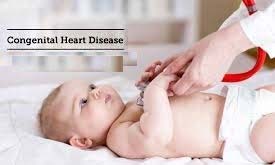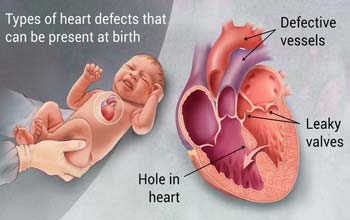What are Congenital Heart Defects?

- If a child has congenital heart defect, the obvious fact is that the child was born with some defect in the structure of their hearts.
- Some defects are simple and do not need any form of treatment such as a small chamber between the heart chambers that close on its own.
- The mere news that your child has a congenital heart defect is bound to leave you worried, but learning about the condition and having an eye on what to expect during the coming months is bound to help you.
What are the impacts of Congenital Heart Defects?
The impacts of Congenital Heart Defects in India are as follows :
- Close to 25 % of children born with this deformity, will need heart surgery or other interventions to survive
- People with congenital heart defects face a long list of health problems with eating and growing, heart failure, sudden cardiac attack or stroke
- An approximate 100 to 200 deaths are due to unrecognized heart disease in newborn each year. These numbers tend to include those before the diagnosis part.
What are the causes of Congenital Heart Defects?
The Causes of Heart Defects are as follows :
- Genetic Syndrome: They tend to occur in families and are associated with many genetic syndromes. Many children with Down syndrome, which is caused by trisomy 21, have heart defects. Genetic testing can detect such orders during fetal development. If you already have a child with congenital heart defect, a counselor can estimate the probability of the next child having one.
- Single Gene : Rarely congenital defects are caused by changes in a single gene. This is the classical case where more than one family member has a heart defect. The chance for the other family member to have this same defect increases to as high as 50 %.
- Environmental Exposures : Heart defects can also occur by something your mother was exposed to her in the pregnancy stage such as a drug or an infection. In that case the chance of your child having a heart defect is no longer higher than that of an average person.
- Unknown Cause : One is not sure of the exact cause of heart defects. Though, the reason behind it is assumed to be genetic, only a few genes have been discovered that have been linked to heart defects. A combination of multiple genetic and environmental factors could be the reasons behind it. There is usually a chance of 2 % to 15 % of heart defect happening in the family. The odds though depend to a great extend on the kind of defect you have or whether anyone else in your family has the heart defect or not.
Are you looking for any medical assistance or guidance for your baby’s Congenital Heart Defect Surgery in India?
Get in touch with us to get a free consultation and guidance towards your treatment planning by contacting us online.
What are the symptoms to look for in children with Congenital Heart Defects?
- Serious heart defects usually become evident soon after birth or after a few months of life. Congenital Heart Defects in India Reviews of patients indicate that the common signs and symptoms include
- Blue color skin or pale grey
- A feeling of grunting when you breathe
- Swelling around the regions of the eyes or the abdomen
- Shortness of breath during feedings leading to poor weight gain
- The less congenital defects may not be detected until late in your childhood stages, as the child may not have noticeable signs of the same problem. If symptoms and signs are evident in older children they may include
- Shortness of breath during activity or exercise
- Swelling in the ankles or the feet
What are the types of Heart defects that can be present at the time of birth?

- Defective vessels
- Leaky valves
- Hole in heart
What treatment is advised for children having congenital heart defects?
- The congenital heart defect may have no long term effect on the health of the child, and in some cases may go unnoticed as well.
- Congenital Heart Surgery is required for some serious defects and requires treatment soon after they are found
Which Treatment Module can be adopted by Doctor’s to treat congenital heart defects?
- Depending upon the type of defect, the doctor advocates the treatment module.
- Surgical procedures : In some cases, the child’s doctor cannot fix the defect of your child using a catheter procedure. In such cases, your child may need surgery to correct the problem. The type of surgery, which your child needs depends upon the type of defect. In some cases invasive heart surgery may be needed, whereas in other cases open heart surgery is the only option. In either of these types of surgeries, the functioning of the heart is stopped, and a heart-lung machine is used to circulate the blood throughout the body during surgery. The main difference between the two surgeries is that in case of open heart surgery, the surgeon has to open the chest.
- Cardiac catheterizations : In some cases, patients may be treated using catheterization techniques. It allows the repair to be done surgically without opening the heart and the chest. The doctor inserts a tube into the leg vein ad guides it to the heart with the help of x ray images. The catheter is positioned at the side of the defect and they often can be used to fix holes or areas of narrowing.
- Heart transplants : If a serious heart defect cannot be ascertained, then heart transplant is the only option left.
Which diagnostic evaluations will be advised by your Doctor to check if your child has congenital heart defect?
- Apart from the physical exam, the tests would include
- Fetal echocardiogram : this allows the doctor to find out on whether your child has a heart defect before he or she is born. This allows the doctor to devise a better treatment plan and the sound waves from the ultrasound are used to create a picture of the baby’s heart.
- Echocardiogram : the doctor may ask you to undergo a regular echocardiogram to diagnose a heart defect after the child has been born
- Electrocardiogram : the electrical activity of the child’s heart is recorded and if they are any rhythm problems it can be ascertained
- Chest X ray : the child may be required to have an X ray to find out if the heart is enlarged, or if the lungs are enlarged or have some extra amount of fluid in them.
- Pulse Oximetry : this test determines on how much amount of oxygen is there in the blood of your child. A sensor is placed at the end of the finger of your child to record the amount of oxygen in the blood of your child.
Which steps can be undertaken to reduce the overall risk of birth defects and possible heart defects?
- Ensure that you have a rubella vaccine : A rubella vaccine during pregnancy may affect your baby’s heart development. Be sure to have yourself vaccinated before you conceive.
- Avoid harmful substances : During pregnancy, leaving the painting and cleaning with strong smelling products to someone else. Also, do not take any herbal or dietary supplements without having the first hand opinion of the doctor. Smoking and alcohol are a strict no during the stages of pregnancy.
- Consume a multivitamin with a folic acid : Daily consumption of 400 grams folic acid has been shown to reduce the birth defects in the brain and spinal cord and may reduce the risk of heart defects as well.
- Control of chronic medical conditions : If you have diabetes, keeping your blood sugar in check can reduce the risk of heart defects. If you have some form of chronic conditions such as epilepsy, that require the use of medications, discuss the risks and benefits of these drugs with your doctor.
9 reasons why you should you travel to India for your child’s congenital heart defects?
- Affordable costs.
- Highly qualified, experienced and well renowned team of surgeons.
- Use of latest technological medical devices.
- NABH accredited Hospitals.
- 24*7 assistance and support provided to the patient.
- Higher rate of successful surgeries.
- Provision of Hygienic environment
- Patient satisfaction and welfare is of top most priority
- Continuous follow-up with patient post surgery
Mr. Hubert Stavonhagen from Germany shares his experience of Congenital Heart Defects Treatment done in India

Mr. Hubert Stavonhagen from Germany
If you are having any congenital heart defect then the doctors at Indian cardiac surgery group are the best you would ever find to consult and get the proper required treatment. I had an issue since childhood that I would start feeling tired very easily and my heart would start pounding. At first, it used to happen rarely but with age it became more persistent and that is when I decided to consult the doctors. They explained me about the congenital heart defect I had in such simpler terms that I did not feel the need to even consider consulting another doctor. They were always available to answer all my questions throughout the procedure which really helped me feel positive about recovery.
If you are ready to proceed for discussion and planning for your child’s treatment in India, you can fill the contact form below and we will get in touch with you very soon. Please feel free to ask all your queries & concerns.

